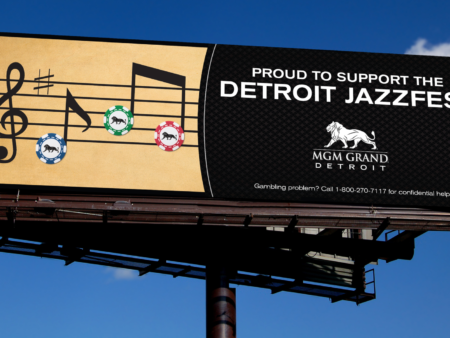
 Image: Michigan.gov
Image: Michigan.gov Michigan went live with legal sports betting and online gambling on January 22 this year. Bill Ordine, a senior reporter and editor of sports and gambling in the country, commented that the Great Lakes State had seen impressive growth. In February alone, residents bet over $300 million using online sports betting sites. So what about the Michigan Gambling Tax?
“DraftKings have seen huge success and is extremely happy with how everything has gone,” Ordine said. “All the operators are thrilled with the Michigan launch and response,” he added.
“There is big money being given away with what seems like no second thought,” Ordine commented on over $1 million in promotions that are currently being offered as MI casino bonuses, sports betting free bets and poker promotions.
So there is a lot of money to be won in Michigan’s best casinos and sportsbooks. But whether you are winning $1 or $1 million, your winnings will be taxed. Still, many of Michigan’s casual bettors aren’t aware of the fact that winnings in the state are also taxed.
“When they receive the tax form for the first time, they can be quite surprised,” said Nathan Rigney, an H&R Block principal tax research analyst.
When the federal ban on sports betting was repealed in 2018, individual states were left to choose whether to legalize it within their state limits. In most states, legalization also includes provisions for online gambling, including casinos and some cases online poker. Michigan was the 20th state to choose to legalize it with a few more states joining since.
What’s the Michigan Gambling Tax Rate?
Just like normal income your sports betting winnings are taxed.
The income tax rates for someone making between $10,000 and $40,000 a year has a 12% federal tax rate, however, someone earning $520,000 per year is taxed at 37%. Plus, Michigan has a 4.25% tax rate for all. So winnings from wagering, whether in person or online, will be added to your total income for the purpose of tax calculations. Note that the wager itself doesn’t count towards taxation, it’s only the net wins that are taxed. This has been confirmed by state officials.
But Wait, there’s Another Tax
In addition to the Michigan state taxes, there are 24 cities in the state that impose an income tax of their own. These communities also require local income taxes on their sports betting winnings.
The 24 cities with the Michigan Gambling Tax rates are as follows:
- Albion, Battle Creek, Benton Harbour, Big Rapids, East Lansing, Flint, Grayling, Hamtramck, Hudson, Ionia, Jackson, Lansing, Lapeer, Muskegon, Muskegon Heights, Pontiac, Port Huron, Portland, Springfield and Walker all have a 1% tax rate
- Grand Rapids and Saginaw has a tax rate of 1.5%
- Highland Park is a 2% tax rate
- Detroit has a 2.4% tax rate.
These rates may change if the person works in the city but has a residence elsewhere. Where you place your bet doesn’t have an impact on the amount you owe. Remember also the MI casino bonuses and other sports book and poker promotions are taxed.
When Is the Michigan Gambling Tax Actually Charged?
This depends on how much you win. Usually, if it’s a small win at one of the best Michigan casinos or sportsbooks, you won’t pay the tax until the tax season next year.
However, operators withhold for federal tax 24% of the winnings if the win is over $5,000, and equal 300 times more than the wager. For lesser wins, no tax is retrieved straight away in most cases.
Exceptions include winnings for non-residents or players who have not provided enough information. In these cases, the best Michigan casinos, sports books and poker rooms may be required to withhold winnings. These delays can be caused by something as simple as not providing a Social Security number or a taxpayer identification number.
If for some reason, more money that your tax bracket requires is being withheld, you will receive a refund on your next tax return. If not enough was withheld, you will have to pay the difference on your next tax assessment.
Are there Specific Tax Forms for Winnings?
Michigan casinos, sports betting, and poker winnings are taxed in different ways throughout the state. Here are the different forms that are required in different cases of winning on gambling when considering the Michigan Gambling Tax.
- W-2G – Certain Gambling Winnings
- This form is sent to those who win $600 or more in a single bet. However, the winnings must be at least 300 times the wager.
- 1099-MISC – Miscellaneous Income
- Anyone who wins at least $600 throughout the year from one casino operator receives this form. This is not a net amount and therefore doesn’t account for the bets you lost. We will discuss how to deduct those losses later.
- 1099-K – Payment Card and Third-Party Network Transactions
- This is the same as 1099-MISC. However, it’s used for those who withdraw their money through third-party groups such as PayPal.
- W-9 – Request for Taxpayer Identification Number and Certification
- You may be asked to fill out this form by online casino operators for ID verification.
- 1040 – U.S. Individual Income Tax Return
- This form will be filled out either by you or your tax preparer at tax season. On this form, your winning income is counted as ‘other income’
The forms you would receive showing your winnings are W-2G and 1099. They will be sent by the casino operators, online or via mail around January.
What are the Thresholds for Games?
There are different thresholds for different games at the best Michigan casinos. The $600 threshold does not apply with every gambling win.
Regarding bingo or slot machine games wins, you will not receive a W-2G form unless you win $1,200. Poker tournaments, on the other hand, have a threshold of $5,000 and Keno is $1,500.
To clarify, these thresholds are just to receive tax documents from the operators. You, however, MUST pay tax on all your winnings in gambling. These include Michigan sports betting, casino, bingo, poker, etc.
Can I Deduct my Gambling Losses?
This is a little more complicated. It makes sense that if you won $1,000 from sports gambling in Michigan but lost $2,000, likely, you don’t want to pay the tax on the $1,000. However, you are still technically liable to pay on the winning even if you lost more.
There is a way you can deduct your losses, but you need to itemize all the deductions on your taxes. For the majority, the normal deduction makes more financial sense than itemizing. It does mean that you’re not able to deduct your losses. Even if you do choose to itemize, you’re only allowed to deduct losses equal to your winnings.
Different rules may apply to people considered as ‘professional gamblers’ and not those who are ‘casual gamblers.’
What if I Don’t Get a Tax Form?
You must pay tax in Michigan on all your winning in gambling regardless of whether you have a tax form sent to you. If you don’t have the form, you will need to rely on your accounting.
“You must, if you’re going to be gambling regularly to keep a track of what they game on, how much is invested, and the return if any,” Ordine says.
If you’re worried about keeping your log, most online casino operators have this option for you. Draftkings has a tab called ‘financial center” with a complete list of transactions, statements and also downloadable tax documents.
You don’t have to count your winning wagers when totalling up your winnings. You may have to subtract those manually come tax season.
What can be the Consequences if I don’t pay the Tax?
When you get sent a W-2G or 1099 form so does the government. If you win enough to warrant such a form, the government will be aware if you avoid paying your taxes.
However, it gets a little harder when you win less than the required amount for receiving a form, which is less than $600 in a year. Smaller-scale gambling states rely on people being honest. They may get away with evading them for a short amount of time but it’s not usually for very long. “If you count yourself a proud American you’re going to report the $20,” said Ordine. Still, all winnings could be subject to audit.
“If the IRS look at your bank statements and see amounts from a sports gambling or a Michigan online casino, they will ask and assess additional tax. This isn’t including penalties and interest.” Rigney says.
When it comes to penalties, Michigan could impose “failure to pay or file”. This is up to 25% of the taxable income. There is also a 10% ‘discretionary negligence penalty” or a 25% “intentional disregard penalty.”
How Much Harder Will it Be to File My Taxes?
It doesn’t have to be. Online preparers including TurboTax and H&R Block have the technology to help figure out the owed tax on the winnings in gambling in Michigan. “TurboTax asks you very simple questions, making the whole process very easy.” Said Lisa Greene-Lewis, a tax expert for TurboTax and a CPA.
The software ensures the right amounts go in the right place on the government forms. However, make sure you speak to a tax specialist to understand all of the implications of sports betting.
“No one wants a surprise tax bill at the end of the day,” Rigney said.
Other Hidden Costs
The free versions of TurboTax and H&R Block tax systems do not offer W-2G or 1099 forms. Meaning if you start sports gambling you will have to upgrade to the Deluxe package to sort your taxes out. The price ranges from $95 to $110 and could fluctuate.
Don’t forget, betting winnings in gambling also count towards your adjusted gross income in Michigan when considering the tax. This can be used to determine eligibility for certain benefits. If your winnings are high enough you could become ineligible for those benefits.
Always Gamble Responsibly and Consult With Professionals About Your Taxes
Just as it is important to gamble safely and responsibly in Michigan casinos and sportsbooks, or anywhere else in the Country and beyond, it is also important to be a law-abiding citizen and pay your taxes. This guide is for reference only and should not be looked as professional tax or financial advice under no circumstances. If you have any questions or you are in doubt, contact the authorities or a certified tax advisor.












